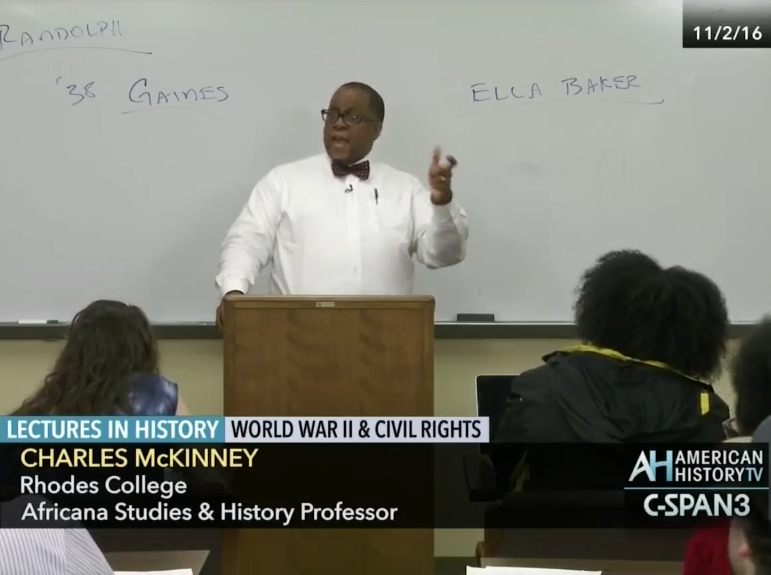Watch a Rhodes history class in action!
Follow us on  Facebook for more info about the Rhodes Department of History.
Facebook for more info about the Rhodes Department of History.
A World of Courses
The history major (11 courses) is extremely flexible offering a wide range of topics from around the globe and fulfilling many of the college’s Foundation requirements, leaving time for minors, double majors, interdisciplinary majors, or graduate school prerequisites. Beyond two required courses, (“The Historian’s Craft” and “Senior Seminar”), students can choose courses in African, Asian, United States, European, Latin American, and Middle Eastern history over several centuries. Coursework taken abroad or at an accredited 4 year institution may be transferred into the major if pre-approved by the department chair.
Sharpen Your Speaking and Interview Skills
History is the only department at Rhodes that prepares its majors to be confident public speakers. All seminars at the 300 level require a substantial oral presentation, and most courses emphasize discussion throughout the semester. Students often present their work on campus and at national and regional meetings of our honor society Phi Alpha Theta.
Sharpen Your Analytical and Writing Skills
History students develop extremely strong skills in analysis, argumentation, and clarity of expression by writing consistently throughout the major. Courses at every level emphasize writing, and in 400 level seminars students produce a substantial essay based on original research. Students often submit their work to our student-edited, peer-reviewed journal the Rhodes Historical Review and other publications (see copies of the RHR on the history website). Students have co-authored published articles with faculty members.
History Students Are the Best and Brightest
Rhodes history majors are among the best in the college and regularly win some of the most prestigious prizes, awards, and accolades on campus and in the nation. They are routinely inducted into Phi Beta Kappa, and for 4 years in a row history majors won the college’s highest academic honor, the Peyton Nalle Rhodes-PBK Prize. History majors have won Watson Fellowships to travel the world, Fulbright Fellowships, Emerson Fellowships, and Truman Scholarships. In 2011, a Rhodes history major won the award given by the American Historical Association for the best published undergraduate paper in the US.
How Our Courses Are Numbered
History 100-level courses. Designed for first-year students and sophomores, these seminars focus on specific topics. These courses are writing intensive and fulfill one of the “written communication” requirements (F2i) under the Foundations Curriculum. Many also fulfill the “historical forces" (F3) requirement.
History 200-level courses. Open to every student at Rhodes -- including first-year students -- these courses cover a broad chronological span or large geographical area and are introductory in nature. In addition to mastering course content, students will begin to learn to think historically through interpretive writing assignments that require them to draw from and engage with course material and readings. Such courses normally fulfill the “historical forces” (F3) requirement. Several of these courses also fulfill the “systematic analysis of human interaction and contemporary institutions” (F8) and the “cultural perspectives” (F9) requirements.
History 300-level courses: These research seminars focus on specific topics or time periods, while paying significant attention to historiography. Students are required to make a significant oral presentation.
History 400-level courses: These research seminars focus on specific topics or time periods, while paying significant attention to historiography. Students are required to complete a substantive research paper in which they engage substantially with primary sources.

